Discussion to nesting
-
marika.solo
- Site Admin
- Posts: 23174
- Joined: 29 Sep 2021, 09:38
Re: Discussion to nesting
continuation - experts opinion
1/ Māris Strazds, Latvia (May 12)
... I cannot comment. „Females sit on males” is a form of reversed mating. I don’t think this is it. I would say some next days might show if my thoughts might be in right direction – I have a few cases with trail-camera images when we can see result, however there is no detailed information in those cases how this start. I mean cases when there is a shortage of food and adult kills juvenile at some point. Could this be the case? ...
2/ Darius Anderwald, Poland (May 14)
... hmm, it's hard to say. They're just animals. I wouldn't look for anything more than some kind of tension relief. ...
3/ Luis Santiago Cano Alonso, Spain (May 14)
... From my point of view, this is simply a weird behaviour of a specimen, as there are many others. ...
1/ Māris Strazds, Latvia (May 12)
... I cannot comment. „Females sit on males” is a form of reversed mating. I don’t think this is it. I would say some next days might show if my thoughts might be in right direction – I have a few cases with trail-camera images when we can see result, however there is no detailed information in those cases how this start. I mean cases when there is a shortage of food and adult kills juvenile at some point. Could this be the case? ...
2/ Darius Anderwald, Poland (May 14)
... hmm, it's hard to say. They're just animals. I wouldn't look for anything more than some kind of tension relief. ...
3/ Luis Santiago Cano Alonso, Spain (May 14)
... From my point of view, this is simply a weird behaviour of a specimen, as there are many others. ...
-
marika.solo
- Site Admin
- Posts: 23174
- Joined: 29 Sep 2021, 09:38
Re: Discussion to nesting
POLAND
Congratulation to Mr. Darius Anderwald and the whole team!

Best practices for the conservation and management of the black stork in Poland – 2024 winner!
english: https://environment.ec.europa.eu/news/b ... refLang=pl
About the winner
Overview
Pictures from the winner
Videos from the winner:
Najlepsze praktyki w zakresie ochrony bociana czarnego i zarządzania nim w Polsce – zwycięzca w 2024 r.
Strona została przetłumaczona maszynowo.: https://environment.ec.europa.eu/news/b ... &etrans=pl
O zwycięzcy
Przegląd
Zdjęcia od zwycięzcy
Filmy zwycięzcy:
Congratulation to Mr. Darius Anderwald and the whole team!

Best practices for the conservation and management of the black stork in Poland – 2024 winner!
english: https://environment.ec.europa.eu/news/b ... refLang=pl
About the winner
Overview
Pictures from the winner
Videos from the winner:
Najlepsze praktyki w zakresie ochrony bociana czarnego i zarządzania nim w Polsce – zwycięzca w 2024 r.
Strona została przetłumaczona maszynowo.: https://environment.ec.europa.eu/news/b ... &etrans=pl
O zwycięzcy
Przegląd
Zdjęcia od zwycięzcy
Filmy zwycięzcy:
-
marika.solo
- Site Admin
- Posts: 23174
- Joined: 29 Sep 2021, 09:38
Re: Discussion to nesting
https://dabasdati.lv/lv/article/par-mel ... es-ligzda/
Māris Strazds 2024-06-20
On ringing black storks in an online nest
I asked for permission to publish the translation of the article here. It contains important information especially for newcomers.
Māris Strazds 2024-06-20
On ringing black storks in an online nest
I asked for permission to publish the translation of the article here. It contains important information especially for newcomers.
-
marika.solo
- Site Admin
- Posts: 23174
- Joined: 29 Sep 2021, 09:38
Re: Discussion to nesting
Anderwald D, Sławski M, Zadworny T, Zawadzki G. Are Current Protection Methods Ensuring the Safe Emancipation of Young Black Storks? Telemetry Study of Space Use by Black Storks (Ciconia nigra) in the Early Post-Breeding Period. Animals. 2024; 14(11):1558. https://doi.org/10.3390/ani14111558
- thirty-four transmitters were placed on birds from 18 nests (the size of the analysed broods ranged from two to four young)
some findings:
- the age of making the first flight attempts at an average of 65 days and the final departure from the nest at an average of 87 days
- the duration of flight in the immediate vicinity of the nest ranged from 10 to 42 days for individuals, with an average of 21 days
- until the nest was completely abandoned, the zone within 200 m of the nest was the most heavily used (birds spent more than 80% of their time in this area)
- after the 70th day of life, young storks usually spent the night outside the nest in the stand at a distance of 200–250 m from the nest
- the average time between the first flight from the nest and the start of migration was 21 days
- the average date of departure of a young BS in Poland was 10 August; nests located further south were left earlier by young birds; nests located further west were left later
For long-distance migrants, such as BSs, the period before the start of migration has a crucial influence on the condition of the bird and may affect the survival rate of migrating birds.
------
STORKLETS in the Bolewicze nest (SKierka + Królewicz) this season/2024:
- first flight attempts: 08.07 and next days - 64 days old
- final departure: 25.07 (4 of them) - 81 days old
- time between the first flight from the nest and the start of migration: 17 days (approx.)
- thirty-four transmitters were placed on birds from 18 nests (the size of the analysed broods ranged from two to four young)
some findings:
- the age of making the first flight attempts at an average of 65 days and the final departure from the nest at an average of 87 days
- the duration of flight in the immediate vicinity of the nest ranged from 10 to 42 days for individuals, with an average of 21 days
- until the nest was completely abandoned, the zone within 200 m of the nest was the most heavily used (birds spent more than 80% of their time in this area)
- after the 70th day of life, young storks usually spent the night outside the nest in the stand at a distance of 200–250 m from the nest
- the average time between the first flight from the nest and the start of migration was 21 days
- the average date of departure of a young BS in Poland was 10 August; nests located further south were left earlier by young birds; nests located further west were left later
For long-distance migrants, such as BSs, the period before the start of migration has a crucial influence on the condition of the bird and may affect the survival rate of migrating birds.
------
STORKLETS in the Bolewicze nest (SKierka + Królewicz) this season/2024:
- first flight attempts: 08.07 and next days - 64 days old
- final departure: 25.07 (4 of them) - 81 days old
- time between the first flight from the nest and the start of migration: 17 days (approx.)
-
marika.solo
- Site Admin
- Posts: 23174
- Joined: 29 Sep 2021, 09:38
Re: Discussion to nesting
LATVIA - nest in Ogres County (Vidzeme)
Ogris and Urga, 4 storklets - 74/74/73/72 days old
regarding to the screaming humans
1/ It is true that this nest site has a protection zone, so called mircoreserve, however, that does not restrict anybody from entering that forest (any time of year). No formal rules are broken here.
5) This nest is quite close to a driveable forest road where it is convenient to park a car, so at some extent it is a surprise that there are so few visits (near bye) so far
7) Adults do not care humans next to nest tree or near bye while approaching nest with (large) juveniles – most of them seem to approach nest „on autopilot” mode. About once in 10 cases during ringing adults approach nest and feed youngs while we are under nest or even on the tree straight under the nest. A few times adult bird has almost landed on back of my college who is IN the nest.
All that said, it is not „innocent” if people frighten birds to the point when they all leave the nest and never return – see my previous email about departure ages. Mean age of birds that leave the nest because of (human; precise cause not known in most cases) disturbance is 76,8 days (67.4-82,6, n=25). Age of this company at the time of my writing is 73,6 (F3), 73,8 (F4), 73,0 (F5) 71,7 (F6). Two of those frightened 25 are younger than the youngest of these four. An important addition to that is – none of those 25 have appeared anywhere afterwards. Some still might (we do have the 1st records of some ringed birds be registered just 10 years after their ringing) but for now they are likely among those that have failed. So I consider significant disturbance this time of year be worse than any other time of breeding season. (Disturbance in early spring may mean there might be no breeding at all, however adults in that case are free and can „enjoy summer” on their own, if it happens now it may mean waste of season, no success plus both adults are exhausted and may have reduced capacity to make it to the next year).
Ogris and Urga, 4 storklets - 74/74/73/72 days old
- I have received by email the information provided by Dr. M.Strazds on this situation (to possibly publish it here - consent of the addressee)
regarding to the screaming humans
1/ It is true that this nest site has a protection zone, so called mircoreserve, however, that does not restrict anybody from entering that forest (any time of year). No formal rules are broken here.
5) This nest is quite close to a driveable forest road where it is convenient to park a car, so at some extent it is a surprise that there are so few visits (near bye) so far
7) Adults do not care humans next to nest tree or near bye while approaching nest with (large) juveniles – most of them seem to approach nest „on autopilot” mode. About once in 10 cases during ringing adults approach nest and feed youngs while we are under nest or even on the tree straight under the nest. A few times adult bird has almost landed on back of my college who is IN the nest.
All that said, it is not „innocent” if people frighten birds to the point when they all leave the nest and never return – see my previous email about departure ages. Mean age of birds that leave the nest because of (human; precise cause not known in most cases) disturbance is 76,8 days (67.4-82,6, n=25). Age of this company at the time of my writing is 73,6 (F3), 73,8 (F4), 73,0 (F5) 71,7 (F6). Two of those frightened 25 are younger than the youngest of these four. An important addition to that is – none of those 25 have appeared anywhere afterwards. Some still might (we do have the 1st records of some ringed birds be registered just 10 years after their ringing) but for now they are likely among those that have failed. So I consider significant disturbance this time of year be worse than any other time of breeding season. (Disturbance in early spring may mean there might be no breeding at all, however adults in that case are free and can „enjoy summer” on their own, if it happens now it may mean waste of season, no success plus both adults are exhausted and may have reduced capacity to make it to the next year).
-
marika.solo
- Site Admin
- Posts: 23174
- Joined: 29 Sep 2021, 09:38
Re: Discussion to nesting
DEFENDING THE NEST
https://www.ciconianigra.sk/viewtopic.p ... 716#p42716
https://www.facebook.com/gallipolicogna ... &ref=notif
LUI, LEI L’ALTRA!
Nel nido di Oliveto Lucano nel #parcogallipolicognato, la coppia di #cicognanera sembra non trovare un po’di intimità! Più di un mese fa, ha scelto questo nido per la riproduzione, ma è continuamente disturbata da un’altra coppia.
Nelle prime settimane di occupazione del nido, capita spesso di osservare degli intrusi che cercano di usurpare il sito. Per difendere il proprio nido, le cicogne eseguono un tipico display (modello motorio stereotipato) di minaccia, l’Up-Down with Bill Clattering, caratterizzato da movimenti veloci e ripetuti del collo verso il basso e poi verso l’alto e indietro, emettendo un suono meccanico prodotto dalla chiusura rapida del becco sbattendo le mandibole, e spesso con qualche beccata sul materiale del nido. Quando si verifica il tentativo di un intruso di posarsi sul nido, la cicogna esegue il Nest Covering Display in cui copre il nido.
HE, SHE THE OTHER!
In the nest of Oliveto Lucano in the #parcogallipolicognato, the pair of #ciconianigra seems to be unable to find a bit of privacy! More than a month ago, they chose this nest for breeding, but are continually disturbed by another pair.
In the first weeks of occupation of the nest, it often happens that intruders try to usurp the site. To defend their nest, storks perform a typical threat display (stereotyped motor pattern), the Up-Down with Bill Clattering, characterised by fast and repeated movements of the neck downwards and then upwards and backwards, emitting a mechanical sound produced by the rapid closure of the bill by banging the mandibles, and often with some pecks on the nest material. When an intruder attempts to land on the nest, the stork performs the Nest Covering Display in which it covers the nest.
pic by me (here posted on 01.04 https://www.ciconianigra.sk/viewtopic.p ... 678#p42678)
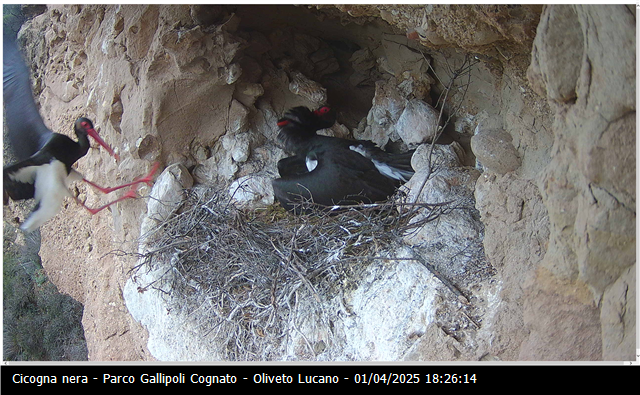
https://www.ciconianigra.sk/viewtopic.p ... 716#p42716
https://www.facebook.com/gallipolicogna ... &ref=notif
LUI, LEI L’ALTRA!
Nel nido di Oliveto Lucano nel #parcogallipolicognato, la coppia di #cicognanera sembra non trovare un po’di intimità! Più di un mese fa, ha scelto questo nido per la riproduzione, ma è continuamente disturbata da un’altra coppia.
Nelle prime settimane di occupazione del nido, capita spesso di osservare degli intrusi che cercano di usurpare il sito. Per difendere il proprio nido, le cicogne eseguono un tipico display (modello motorio stereotipato) di minaccia, l’Up-Down with Bill Clattering, caratterizzato da movimenti veloci e ripetuti del collo verso il basso e poi verso l’alto e indietro, emettendo un suono meccanico prodotto dalla chiusura rapida del becco sbattendo le mandibole, e spesso con qualche beccata sul materiale del nido. Quando si verifica il tentativo di un intruso di posarsi sul nido, la cicogna esegue il Nest Covering Display in cui copre il nido.
HE, SHE THE OTHER!
In the nest of Oliveto Lucano in the #parcogallipolicognato, the pair of #ciconianigra seems to be unable to find a bit of privacy! More than a month ago, they chose this nest for breeding, but are continually disturbed by another pair.
In the first weeks of occupation of the nest, it often happens that intruders try to usurp the site. To defend their nest, storks perform a typical threat display (stereotyped motor pattern), the Up-Down with Bill Clattering, characterised by fast and repeated movements of the neck downwards and then upwards and backwards, emitting a mechanical sound produced by the rapid closure of the bill by banging the mandibles, and often with some pecks on the nest material. When an intruder attempts to land on the nest, the stork performs the Nest Covering Display in which it covers the nest.
pic by me (here posted on 01.04 https://www.ciconianigra.sk/viewtopic.p ... 678#p42678)

-
marika.solo
- Site Admin
- Posts: 23174
- Joined: 29 Sep 2021, 09:38
Re: Discussion to nesting
“PIP WATCH”
- The pip is the first tiny hole in the egg shell, made by the chick as it begins pecking its way out of the shell. A pip is created by the chick using its egg tooth. It is the beginning of the hatching process.
You can look for the pip when they are doing egg rolls. You need to see the blunt end of the egg; that’s where the pip first forms.
- But before we see a pip, we are apt to hear muffled peeps coming from the chick inside the egg. That and the reactions of the adult sensing movement are apt to be the first signs that a hatch is imminent.
EGG TALK
Baby bird chirps from inside the egg usually on the last 2 days - the sound the baby bird makes indicates that the baby bird is hatching soon.
An average, the gestation phase between egg lay and first pip is 32 days.
- video from the past by our forum member Madli : Egg talk loud and clear!
- The pip is the first tiny hole in the egg shell, made by the chick as it begins pecking its way out of the shell. A pip is created by the chick using its egg tooth. It is the beginning of the hatching process.
You can look for the pip when they are doing egg rolls. You need to see the blunt end of the egg; that’s where the pip first forms.
- But before we see a pip, we are apt to hear muffled peeps coming from the chick inside the egg. That and the reactions of the adult sensing movement are apt to be the first signs that a hatch is imminent.
EGG TALK
Baby bird chirps from inside the egg usually on the last 2 days - the sound the baby bird makes indicates that the baby bird is hatching soon.
An average, the gestation phase between egg lay and first pip is 32 days.
- video from the past by our forum member Madli : Egg talk loud and clear!
-
marika.solo
- Site Admin
- Posts: 23174
- Joined: 29 Sep 2021, 09:38
Re: Discussion to nesting
HATCHING
The chicks start hatching after 30 to 38 days. The length of the incubation period depends to a large extent on the weather (fluctuations in air temperatures, rainfall, etc.).
excellent video - egg talk + hatch
by Norden Arks uploaded 26.04.2023
Young birds have a “hatching tooth” and special muscle that allows the hatchling to move its head upwards with enough force to crack the egg with its tooth.
How an Egg Hatches
The shell may look the same as when the egg was laid, but out of sight, it's been changing. It's been getting thinner. The chick has been absorbing calcium from the shell into its own bones, making itself stronger and the shell weaker. Not only that, but it also used the shell's calcium to create a tool to help it break free: A hard, jagged tip on the end of its bill - an egg-tooth. The chick couldn't have broken free without it. Even so, it can still take hours, sometimes days, to hammer its way out of a shell.
The chicks start hatching after 30 to 38 days. The length of the incubation period depends to a large extent on the weather (fluctuations in air temperatures, rainfall, etc.).
excellent video - egg talk + hatch
by Norden Arks uploaded 26.04.2023
Young birds have a “hatching tooth” and special muscle that allows the hatchling to move its head upwards with enough force to crack the egg with its tooth.
How an Egg Hatches
The shell may look the same as when the egg was laid, but out of sight, it's been changing. It's been getting thinner. The chick has been absorbing calcium from the shell into its own bones, making itself stronger and the shell weaker. Not only that, but it also used the shell's calcium to create a tool to help it break free: A hard, jagged tip on the end of its bill - an egg-tooth. The chick couldn't have broken free without it. Even so, it can still take hours, sometimes days, to hammer its way out of a shell.
-
marika.solo
- Site Admin
- Posts: 23174
- Joined: 29 Sep 2021, 09:38
Re: Discussion to nesting
26.06.2025
SPAIN Tajo Internacional (Natalio/M and Zica/F)
in comments to this video https://youtu.be/74fYDIELWaI?si=mzQPXaY7BkrJmVaL by our Maria Lewandowska:
@vida7969
Dokładnie 4:56, przez chwilę wyraźnie widać „spiczasty” kształt głowy.
Na podstawie moich obserwacji białych bocianów przez kilka lat, ten młody bocian jest samicą. Zica ma taką samą głowę, Natalio ma bardziej okrągłą głowę. Na pierwszych filmach, gdy spędzają więcej czasu razem w gnieździe, różnica jest wyraźnie widoczna. Nie jest to poparte żadnymi znanymi mi badaniami, ale pokazałem to doświadczonym obserwatorom i chociaż niczego nie można potwierdzić, przyznają, że istnieje różnica.
Wyjaśniam to tutaj na wypadek, gdyby istniały informacje na ten temat w innych krajach lub można by się z nimi zapoznać. Myślę, że mam kilka zdjęć z zeszłego roku, na których Zica i Natalio są razem w gnieździe, na których wyraźnie widać to, co mówię.
Gracias María
Vida is from Spain (!)
Exactly 4:56, for a moment you can clearly see the “pointy” shape of the head.
Based on my observations of white storks over several years, this young stork is a female. Zica has the same head, Natalio has a rounder head. In the first videos, when they spend more time together in the nest, the difference is clearly visible. This is not supported by any research that I know of, but I have shown it to experienced observers and although nothing can be confirmed, they admit that there is a difference.
I am explaining this here in case there is information on this in other countries or you can consult it. I think I have some photos from last year where Zica and Natalio are together in the nest, where you can clearly see what I am saying.
Gracias María
ZICA (04.04.2025)
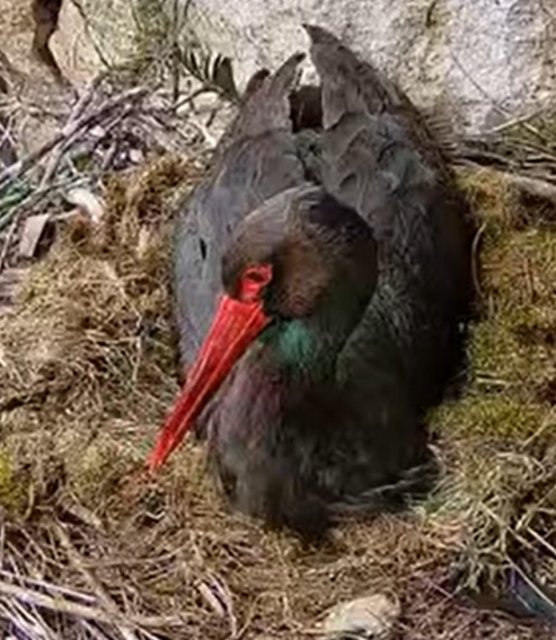
continuation
https://www.ciconianigra.sk/viewtopic.p ... 366#p48366
SPAIN Tajo Internacional (Natalio/M and Zica/F)
in comments to this video https://youtu.be/74fYDIELWaI?si=mzQPXaY7BkrJmVaL by our Maria Lewandowska:
@vida7969
Dokładnie 4:56, przez chwilę wyraźnie widać „spiczasty” kształt głowy.
Na podstawie moich obserwacji białych bocianów przez kilka lat, ten młody bocian jest samicą. Zica ma taką samą głowę, Natalio ma bardziej okrągłą głowę. Na pierwszych filmach, gdy spędzają więcej czasu razem w gnieździe, różnica jest wyraźnie widoczna. Nie jest to poparte żadnymi znanymi mi badaniami, ale pokazałem to doświadczonym obserwatorom i chociaż niczego nie można potwierdzić, przyznają, że istnieje różnica.
Wyjaśniam to tutaj na wypadek, gdyby istniały informacje na ten temat w innych krajach lub można by się z nimi zapoznać. Myślę, że mam kilka zdjęć z zeszłego roku, na których Zica i Natalio są razem w gnieździe, na których wyraźnie widać to, co mówię.
Gracias María
Vida is from Spain (!)
Exactly 4:56, for a moment you can clearly see the “pointy” shape of the head.
Based on my observations of white storks over several years, this young stork is a female. Zica has the same head, Natalio has a rounder head. In the first videos, when they spend more time together in the nest, the difference is clearly visible. This is not supported by any research that I know of, but I have shown it to experienced observers and although nothing can be confirmed, they admit that there is a difference.
I am explaining this here in case there is information on this in other countries or you can consult it. I think I have some photos from last year where Zica and Natalio are together in the nest, where you can clearly see what I am saying.
Gracias María
ZICA (04.04.2025)

continuation
https://www.ciconianigra.sk/viewtopic.p ... 366#p48366
-
marika.solo
- Site Admin
- Posts: 23174
- Joined: 29 Sep 2021, 09:38
Re: Discussion to nesting
continuation
Natalio in foreground (19.02.2025)
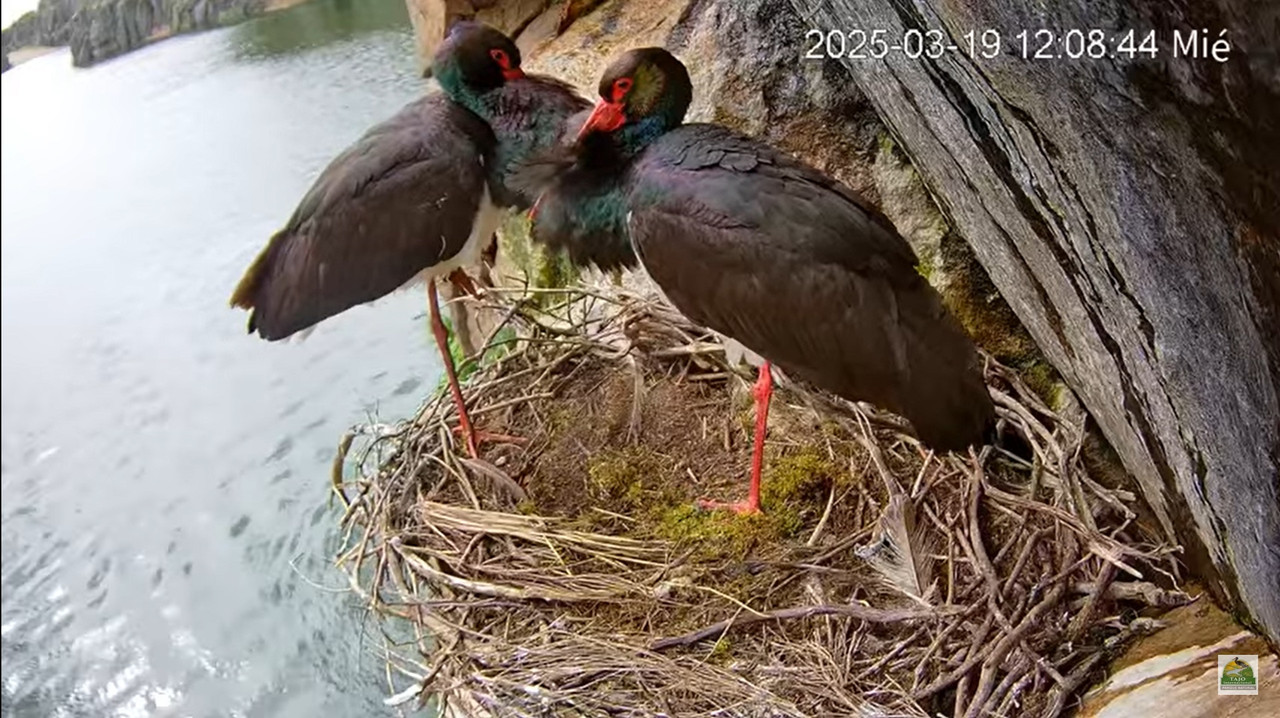
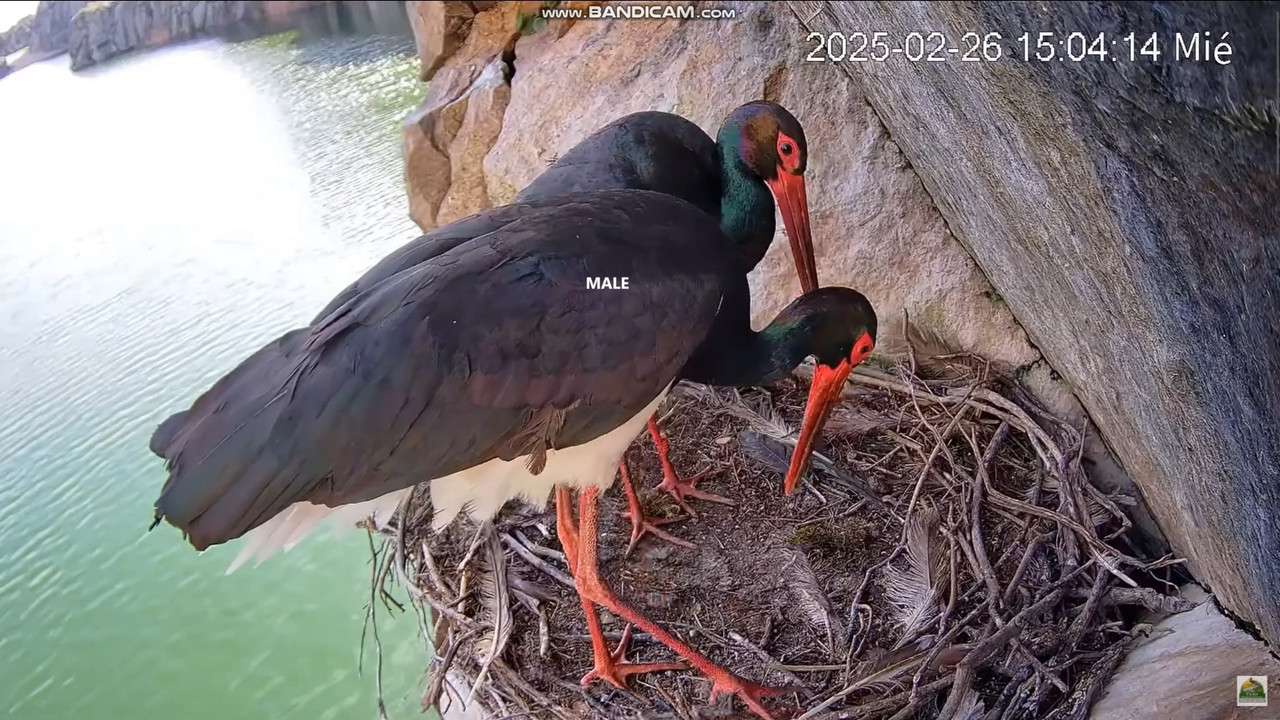
Males generally have a larger and broader head with a more angular profile.
Females tend to have a smaller, more slender head with a slightly rounder shape.
(These differences are very subtle and not always reliable in field conditions.)
white stork (!) by Fikret Can
https://www.facebook.com/groups/LEylekE ... 772874144/
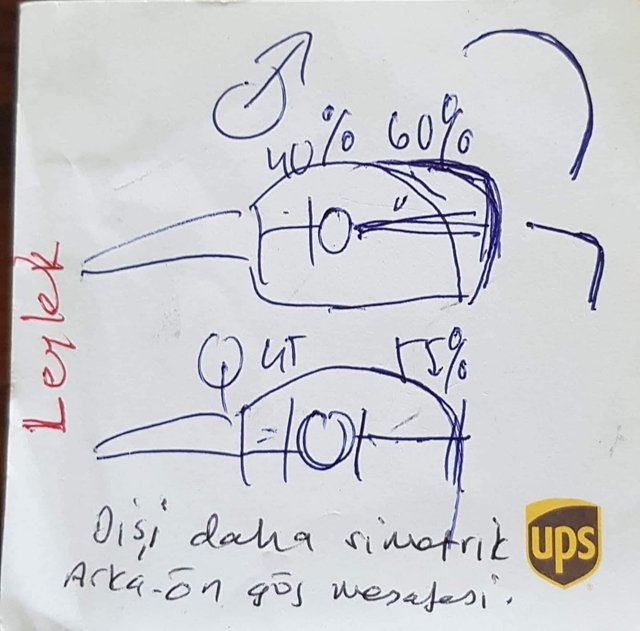

Btw.
The male usually has a slightly longer and thicker bill than the female.
This difference is often subtle and only noticeable mostly only when both sexes are seen side-by-side.)
Natalio in foreground (19.02.2025)


Males generally have a larger and broader head with a more angular profile.
Females tend to have a smaller, more slender head with a slightly rounder shape.
(These differences are very subtle and not always reliable in field conditions.)
white stork (!) by Fikret Can
https://www.facebook.com/groups/LEylekE ... 772874144/


Btw.
The male usually has a slightly longer and thicker bill than the female.
This difference is often subtle and only noticeable mostly only when both sexes are seen side-by-side.)